University Assignment: Family Involvement in Patient Resuscitation
VerifiedAdded on 2023/03/17
|6
|1787
|92
Report
AI Summary
This report presents a literature review examining the role of family involvement during patient resuscitation. The study investigates various nursing approaches and the psychological impact of family presence on both patients and their loved ones. The review utilizes findings from the National Centre for Biotechnology Information, focusing on systematic reviews to provide the strongest evidence. The PICO framework (Population/Problem, Intervention, Comparison, Outcome) is applied to streamline the search process, with keywords such as "family," "resuscitation," and "nurse." Key findings highlight the psychological benefits of family presence, including reduced grief and stress, and the importance of support systems for families during this critical time. The review emphasizes the need for hospitals to develop policies regarding family presence and the necessity of providing support to help families cope with the emotional challenges of witnessing resuscitation. The report concludes that while family presence offers psychological benefits, it is crucial to provide support to families during and after the process.
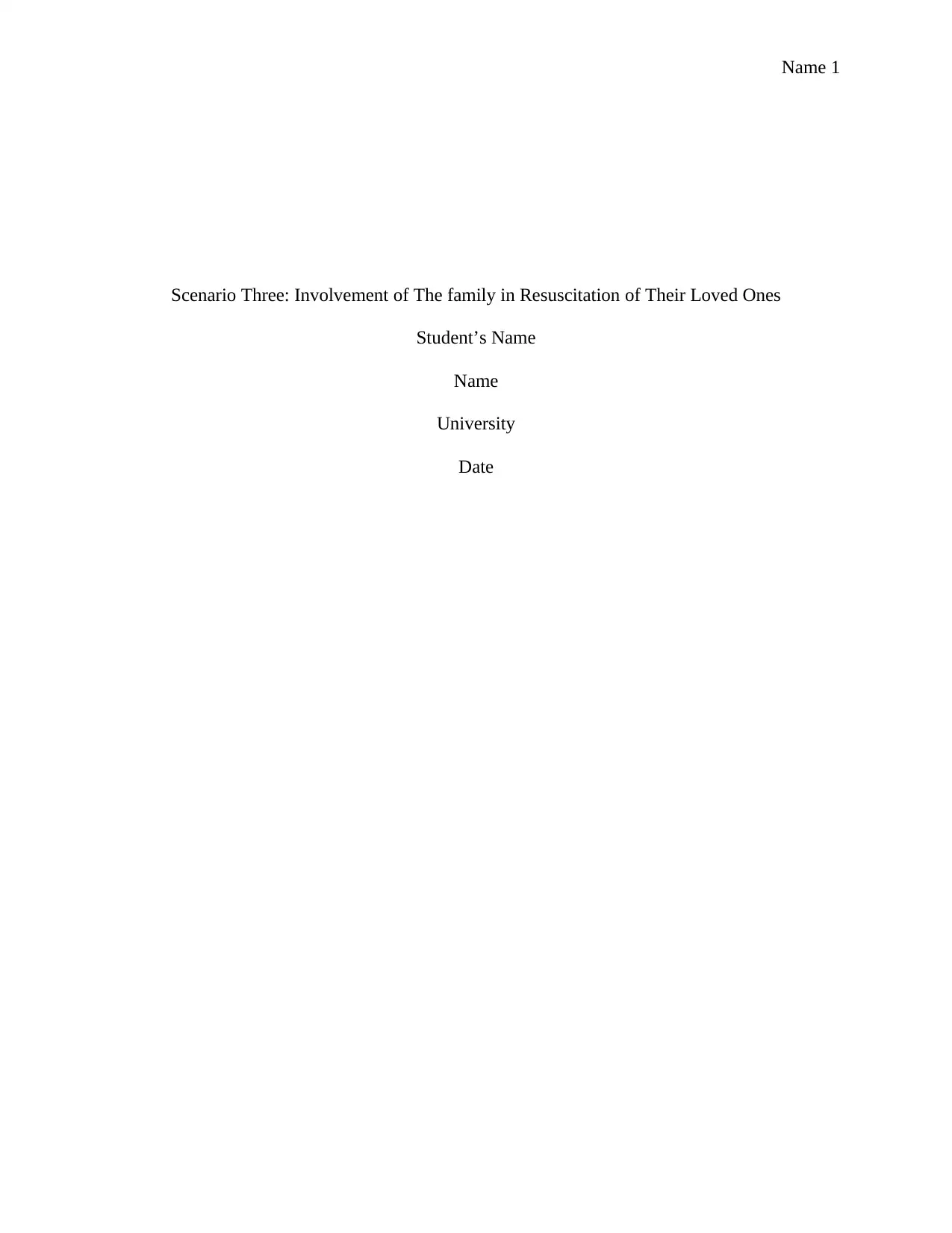
Name 1
Scenario Three: Involvement of The family in Resuscitation of Their Loved Ones
Student’s Name
Name
University
Date
Scenario Three: Involvement of The family in Resuscitation of Their Loved Ones
Student’s Name
Name
University
Date
Paraphrase This Document
Need a fresh take? Get an instant paraphrase of this document with our AI Paraphraser
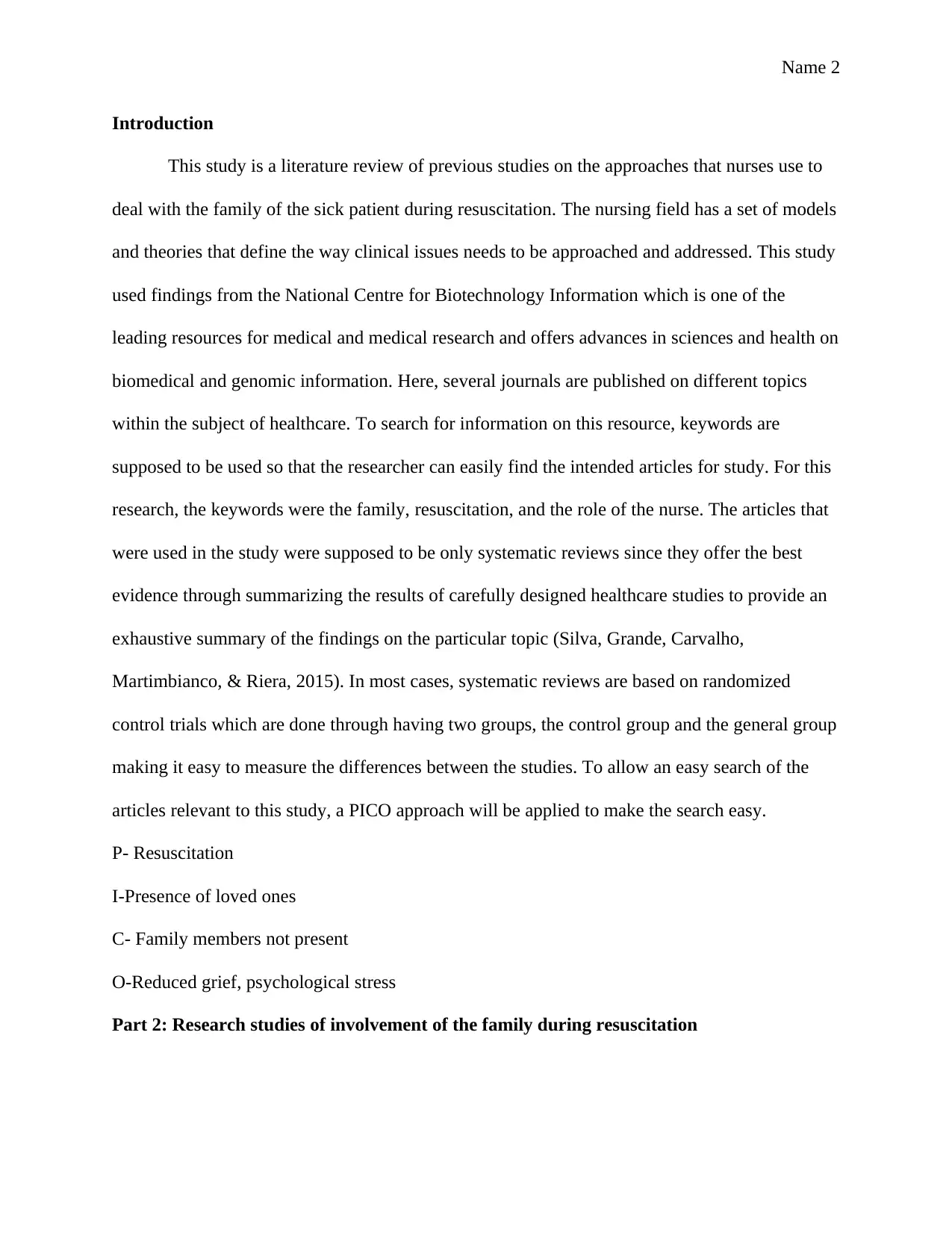
Name 2
Introduction
This study is a literature review of previous studies on the approaches that nurses use to
deal with the family of the sick patient during resuscitation. The nursing field has a set of models
and theories that define the way clinical issues needs to be approached and addressed. This study
used findings from the National Centre for Biotechnology Information which is one of the
leading resources for medical and medical research and offers advances in sciences and health on
biomedical and genomic information. Here, several journals are published on different topics
within the subject of healthcare. To search for information on this resource, keywords are
supposed to be used so that the researcher can easily find the intended articles for study. For this
research, the keywords were the family, resuscitation, and the role of the nurse. The articles that
were used in the study were supposed to be only systematic reviews since they offer the best
evidence through summarizing the results of carefully designed healthcare studies to provide an
exhaustive summary of the findings on the particular topic (Silva, Grande, Carvalho,
Martimbianco, & Riera, 2015). In most cases, systematic reviews are based on randomized
control trials which are done through having two groups, the control group and the general group
making it easy to measure the differences between the studies. To allow an easy search of the
articles relevant to this study, a PICO approach will be applied to make the search easy.
P- Resuscitation
I-Presence of loved ones
C- Family members not present
O-Reduced grief, psychological stress
Part 2: Research studies of involvement of the family during resuscitation
Introduction
This study is a literature review of previous studies on the approaches that nurses use to
deal with the family of the sick patient during resuscitation. The nursing field has a set of models
and theories that define the way clinical issues needs to be approached and addressed. This study
used findings from the National Centre for Biotechnology Information which is one of the
leading resources for medical and medical research and offers advances in sciences and health on
biomedical and genomic information. Here, several journals are published on different topics
within the subject of healthcare. To search for information on this resource, keywords are
supposed to be used so that the researcher can easily find the intended articles for study. For this
research, the keywords were the family, resuscitation, and the role of the nurse. The articles that
were used in the study were supposed to be only systematic reviews since they offer the best
evidence through summarizing the results of carefully designed healthcare studies to provide an
exhaustive summary of the findings on the particular topic (Silva, Grande, Carvalho,
Martimbianco, & Riera, 2015). In most cases, systematic reviews are based on randomized
control trials which are done through having two groups, the control group and the general group
making it easy to measure the differences between the studies. To allow an easy search of the
articles relevant to this study, a PICO approach will be applied to make the search easy.
P- Resuscitation
I-Presence of loved ones
C- Family members not present
O-Reduced grief, psychological stress
Part 2: Research studies of involvement of the family during resuscitation
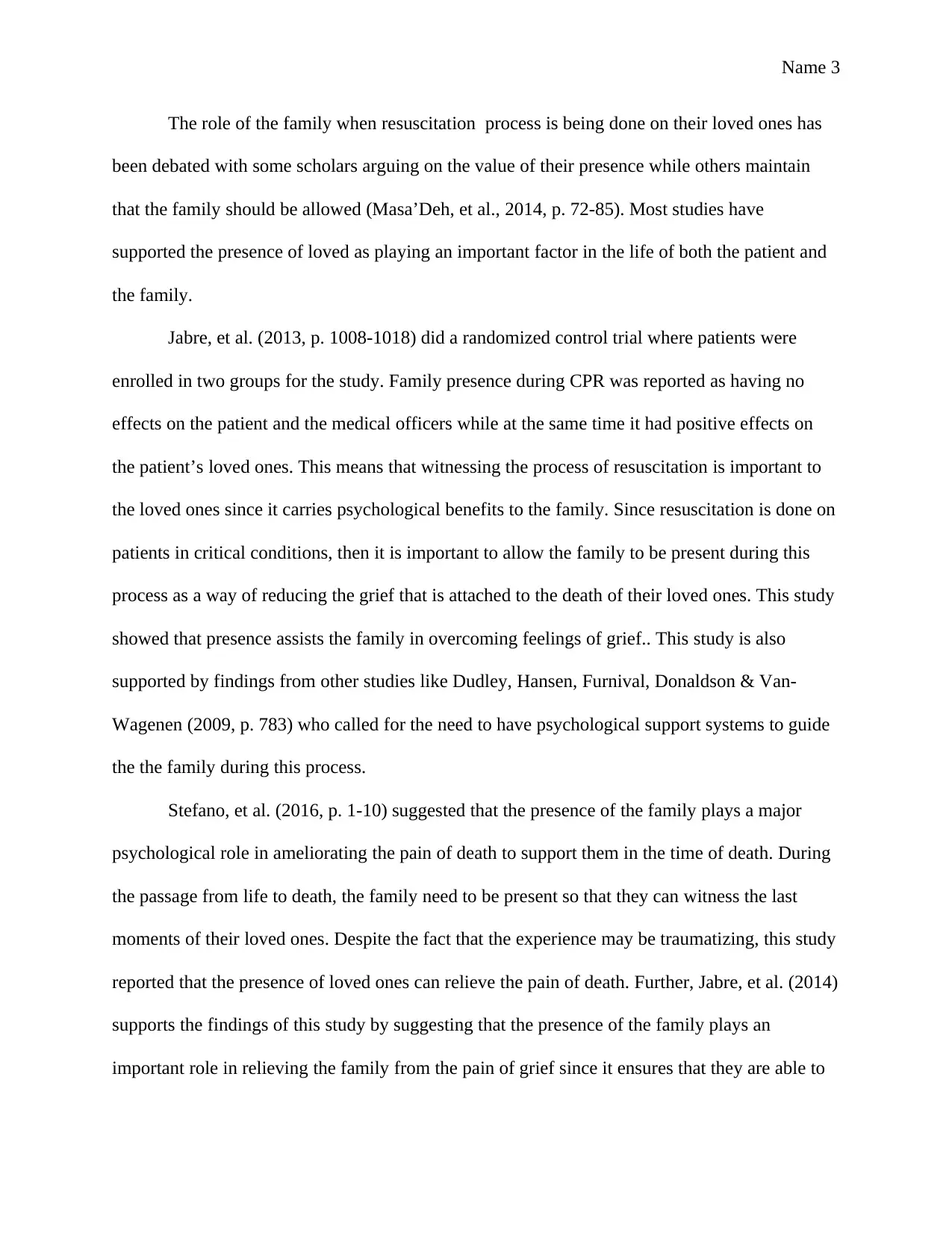
Name 3
The role of the family when resuscitation process is being done on their loved ones has
been debated with some scholars arguing on the value of their presence while others maintain
that the family should be allowed (Masa’Deh, et al., 2014, p. 72-85). Most studies have
supported the presence of loved as playing an important factor in the life of both the patient and
the family.
Jabre, et al. (2013, p. 1008-1018) did a randomized control trial where patients were
enrolled in two groups for the study. Family presence during CPR was reported as having no
effects on the patient and the medical officers while at the same time it had positive effects on
the patient’s loved ones. This means that witnessing the process of resuscitation is important to
the loved ones since it carries psychological benefits to the family. Since resuscitation is done on
patients in critical conditions, then it is important to allow the family to be present during this
process as a way of reducing the grief that is attached to the death of their loved ones. This study
showed that presence assists the family in overcoming feelings of grief.. This study is also
supported by findings from other studies like Dudley, Hansen, Furnival, Donaldson & Van-
Wagenen (2009, p. 783) who called for the need to have psychological support systems to guide
the the family during this process.
Stefano, et al. (2016, p. 1-10) suggested that the presence of the family plays a major
psychological role in ameliorating the pain of death to support them in the time of death. During
the passage from life to death, the family need to be present so that they can witness the last
moments of their loved ones. Despite the fact that the experience may be traumatizing, this study
reported that the presence of loved ones can relieve the pain of death. Further, Jabre, et al. (2014)
supports the findings of this study by suggesting that the presence of the family plays an
important role in relieving the family from the pain of grief since it ensures that they are able to
The role of the family when resuscitation process is being done on their loved ones has
been debated with some scholars arguing on the value of their presence while others maintain
that the family should be allowed (Masa’Deh, et al., 2014, p. 72-85). Most studies have
supported the presence of loved as playing an important factor in the life of both the patient and
the family.
Jabre, et al. (2013, p. 1008-1018) did a randomized control trial where patients were
enrolled in two groups for the study. Family presence during CPR was reported as having no
effects on the patient and the medical officers while at the same time it had positive effects on
the patient’s loved ones. This means that witnessing the process of resuscitation is important to
the loved ones since it carries psychological benefits to the family. Since resuscitation is done on
patients in critical conditions, then it is important to allow the family to be present during this
process as a way of reducing the grief that is attached to the death of their loved ones. This study
showed that presence assists the family in overcoming feelings of grief.. This study is also
supported by findings from other studies like Dudley, Hansen, Furnival, Donaldson & Van-
Wagenen (2009, p. 783) who called for the need to have psychological support systems to guide
the the family during this process.
Stefano, et al. (2016, p. 1-10) suggested that the presence of the family plays a major
psychological role in ameliorating the pain of death to support them in the time of death. During
the passage from life to death, the family need to be present so that they can witness the last
moments of their loved ones. Despite the fact that the experience may be traumatizing, this study
reported that the presence of loved ones can relieve the pain of death. Further, Jabre, et al. (2014)
supports the findings of this study by suggesting that the presence of the family plays an
important role in relieving the family from the pain of grief since it ensures that they are able to
⊘ This is a preview!⊘
Do you want full access?
Subscribe today to unlock all pages.

Trusted by 1+ million students worldwide
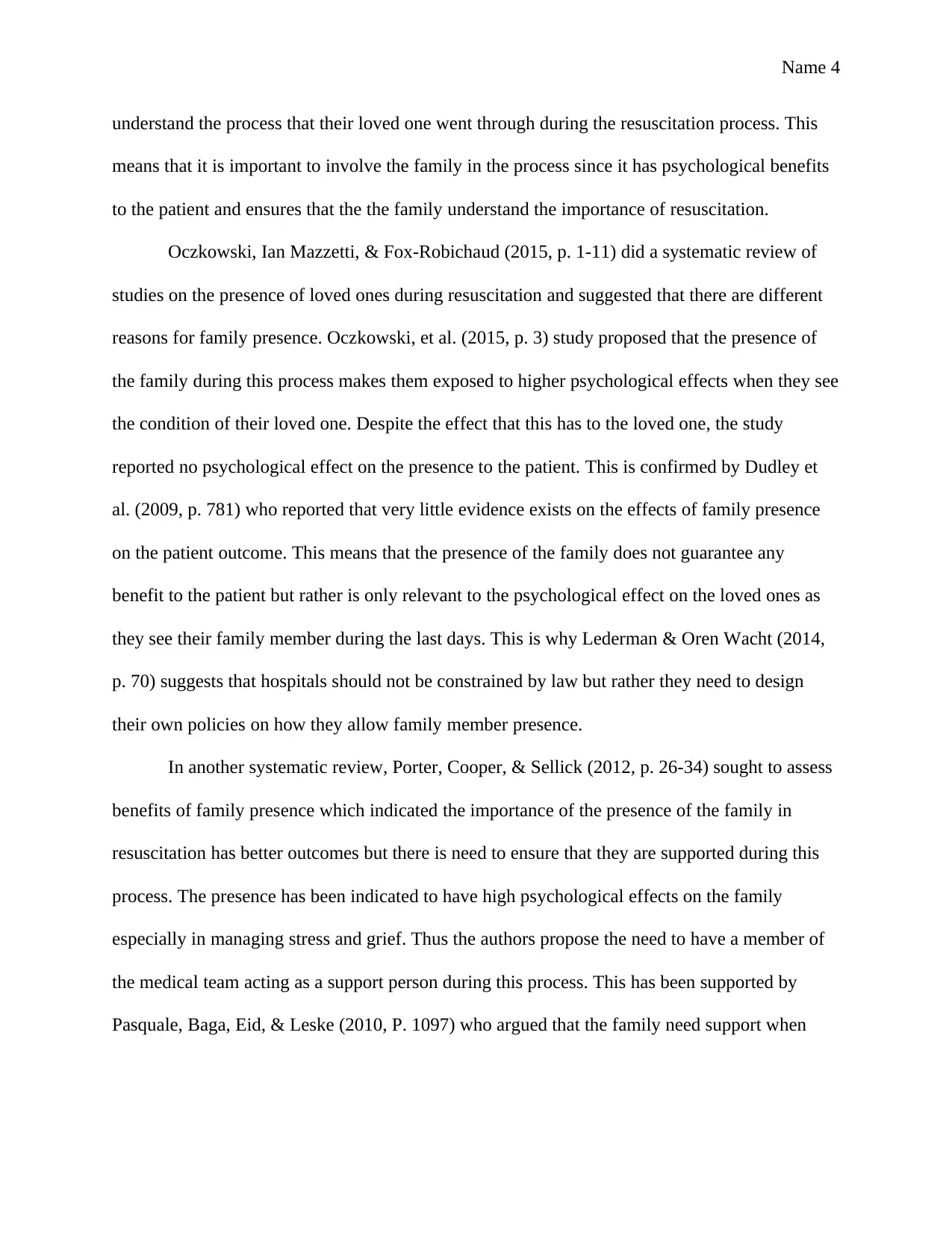
Name 4
understand the process that their loved one went through during the resuscitation process. This
means that it is important to involve the family in the process since it has psychological benefits
to the patient and ensures that the the family understand the importance of resuscitation.
Oczkowski, Ian Mazzetti, & Fox-Robichaud (2015, p. 1-11) did a systematic review of
studies on the presence of loved ones during resuscitation and suggested that there are different
reasons for family presence. Oczkowski, et al. (2015, p. 3) study proposed that the presence of
the family during this process makes them exposed to higher psychological effects when they see
the condition of their loved one. Despite the effect that this has to the loved one, the study
reported no psychological effect on the presence to the patient. This is confirmed by Dudley et
al. (2009, p. 781) who reported that very little evidence exists on the effects of family presence
on the patient outcome. This means that the presence of the family does not guarantee any
benefit to the patient but rather is only relevant to the psychological effect on the loved ones as
they see their family member during the last days. This is why Lederman & Oren Wacht (2014,
p. 70) suggests that hospitals should not be constrained by law but rather they need to design
their own policies on how they allow family member presence.
In another systematic review, Porter, Cooper, & Sellick (2012, p. 26-34) sought to assess
benefits of family presence which indicated the importance of the presence of the family in
resuscitation has better outcomes but there is need to ensure that they are supported during this
process. The presence has been indicated to have high psychological effects on the family
especially in managing stress and grief. Thus the authors propose the need to have a member of
the medical team acting as a support person during this process. This has been supported by
Pasquale, Baga, Eid, & Leske (2010, P. 1097) who argued that the family need support when
understand the process that their loved one went through during the resuscitation process. This
means that it is important to involve the family in the process since it has psychological benefits
to the patient and ensures that the the family understand the importance of resuscitation.
Oczkowski, Ian Mazzetti, & Fox-Robichaud (2015, p. 1-11) did a systematic review of
studies on the presence of loved ones during resuscitation and suggested that there are different
reasons for family presence. Oczkowski, et al. (2015, p. 3) study proposed that the presence of
the family during this process makes them exposed to higher psychological effects when they see
the condition of their loved one. Despite the effect that this has to the loved one, the study
reported no psychological effect on the presence to the patient. This is confirmed by Dudley et
al. (2009, p. 781) who reported that very little evidence exists on the effects of family presence
on the patient outcome. This means that the presence of the family does not guarantee any
benefit to the patient but rather is only relevant to the psychological effect on the loved ones as
they see their family member during the last days. This is why Lederman & Oren Wacht (2014,
p. 70) suggests that hospitals should not be constrained by law but rather they need to design
their own policies on how they allow family member presence.
In another systematic review, Porter, Cooper, & Sellick (2012, p. 26-34) sought to assess
benefits of family presence which indicated the importance of the presence of the family in
resuscitation has better outcomes but there is need to ensure that they are supported during this
process. The presence has been indicated to have high psychological effects on the family
especially in managing stress and grief. Thus the authors propose the need to have a member of
the medical team acting as a support person during this process. This has been supported by
Pasquale, Baga, Eid, & Leske (2010, P. 1097) who argued that the family need support when
Paraphrase This Document
Need a fresh take? Get an instant paraphrase of this document with our AI Paraphraser
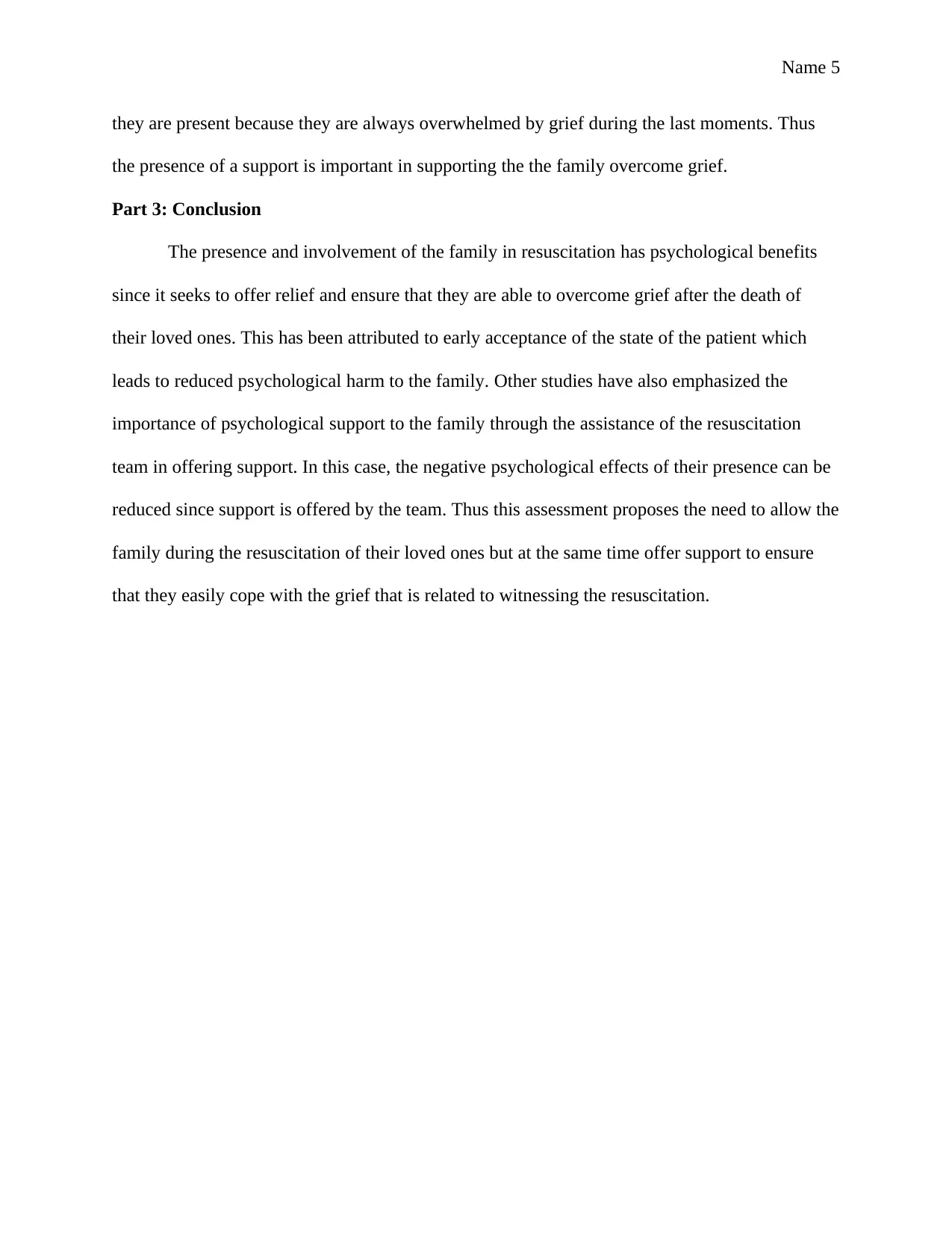
Name 5
they are present because they are always overwhelmed by grief during the last moments. Thus
the presence of a support is important in supporting the the family overcome grief.
Part 3: Conclusion
The presence and involvement of the family in resuscitation has psychological benefits
since it seeks to offer relief and ensure that they are able to overcome grief after the death of
their loved ones. This has been attributed to early acceptance of the state of the patient which
leads to reduced psychological harm to the family. Other studies have also emphasized the
importance of psychological support to the family through the assistance of the resuscitation
team in offering support. In this case, the negative psychological effects of their presence can be
reduced since support is offered by the team. Thus this assessment proposes the need to allow the
family during the resuscitation of their loved ones but at the same time offer support to ensure
that they easily cope with the grief that is related to witnessing the resuscitation.
they are present because they are always overwhelmed by grief during the last moments. Thus
the presence of a support is important in supporting the the family overcome grief.
Part 3: Conclusion
The presence and involvement of the family in resuscitation has psychological benefits
since it seeks to offer relief and ensure that they are able to overcome grief after the death of
their loved ones. This has been attributed to early acceptance of the state of the patient which
leads to reduced psychological harm to the family. Other studies have also emphasized the
importance of psychological support to the family through the assistance of the resuscitation
team in offering support. In this case, the negative psychological effects of their presence can be
reduced since support is offered by the team. Thus this assessment proposes the need to allow the
family during the resuscitation of their loved ones but at the same time offer support to ensure
that they easily cope with the grief that is related to witnessing the resuscitation.
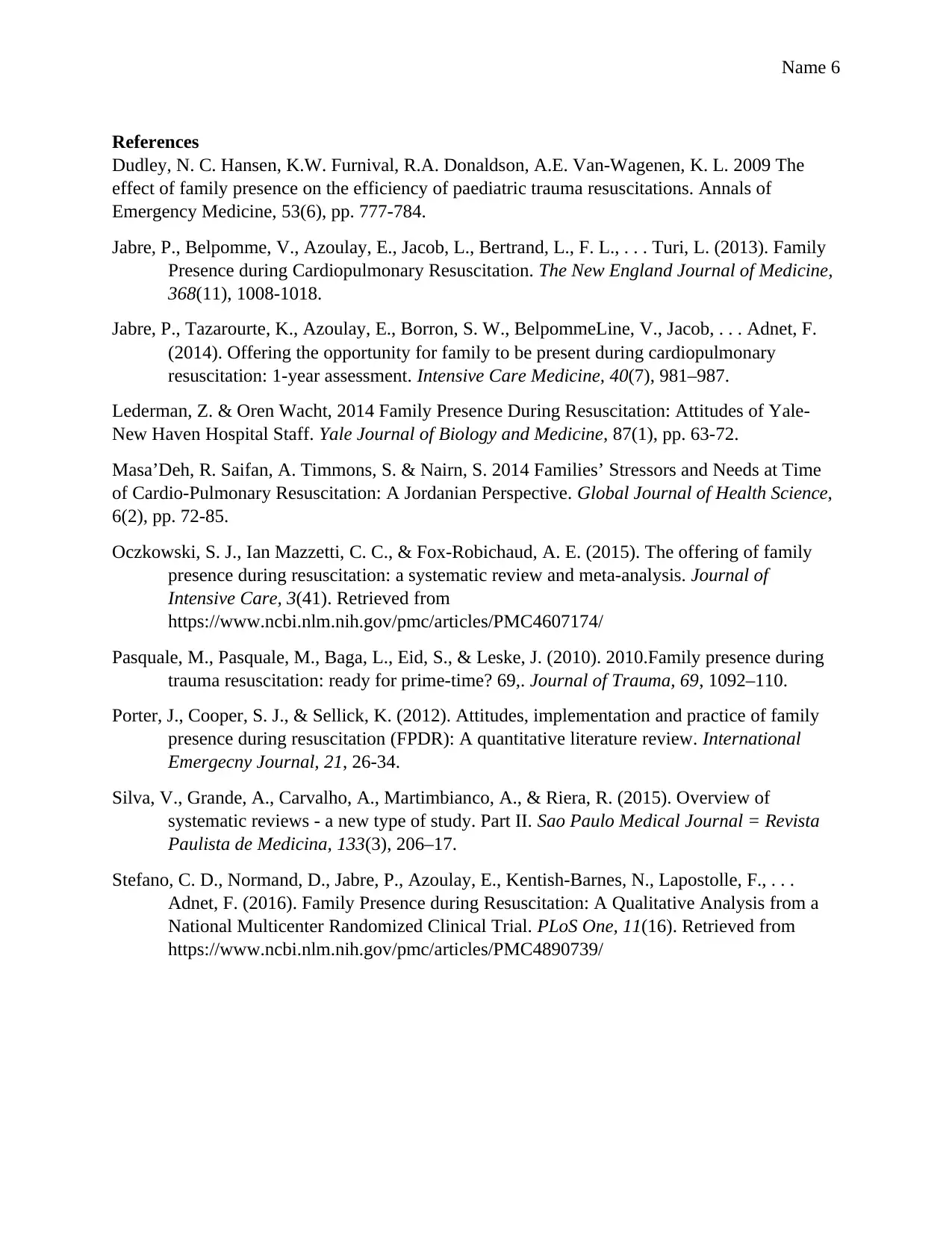
Name 6
References
Dudley, N. C. Hansen, K.W. Furnival, R.A. Donaldson, A.E. Van-Wagenen, K. L. 2009 The
effect of family presence on the efficiency of paediatric trauma resuscitations. Annals of
Emergency Medicine, 53(6), pp. 777-784.
Jabre, P., Belpomme, V., Azoulay, E., Jacob, L., Bertrand, L., F. L., . . . Turi, L. (2013). Family
Presence during Cardiopulmonary Resuscitation. The New England Journal of Medicine,
368(11), 1008-1018.
Jabre, P., Tazarourte, K., Azoulay, E., Borron, S. W., BelpommeLine, V., Jacob, . . . Adnet, F.
(2014). Offering the opportunity for family to be present during cardiopulmonary
resuscitation: 1-year assessment. Intensive Care Medicine, 40(7), 981–987.
Lederman, Z. & Oren Wacht, 2014 Family Presence During Resuscitation: Attitudes of Yale-
New Haven Hospital Staff. Yale Journal of Biology and Medicine, 87(1), pp. 63-72.
Masa’Deh, R. Saifan, A. Timmons, S. & Nairn, S. 2014 Families’ Stressors and Needs at Time
of Cardio-Pulmonary Resuscitation: A Jordanian Perspective. Global Journal of Health Science,
6(2), pp. 72-85.
Oczkowski, S. J., Ian Mazzetti, C. C., & Fox-Robichaud, A. E. (2015). The offering of family
presence during resuscitation: a systematic review and meta-analysis. Journal of
Intensive Care, 3(41). Retrieved from
https://www.ncbi.nlm.nih.gov/pmc/articles/PMC4607174/
Pasquale, M., Pasquale, M., Baga, L., Eid, S., & Leske, J. (2010). 2010.Family presence during
trauma resuscitation: ready for prime-time? 69,. Journal of Trauma, 69, 1092–110.
Porter, J., Cooper, S. J., & Sellick, K. (2012). Attitudes, implementation and practice of family
presence during resuscitation (FPDR): A quantitative literature review. International
Emergecny Journal, 21, 26-34.
Silva, V., Grande, A., Carvalho, A., Martimbianco, A., & Riera, R. (2015). Overview of
systematic reviews - a new type of study. Part II. Sao Paulo Medical Journal = Revista
Paulista de Medicina, 133(3), 206–17.
Stefano, C. D., Normand, D., Jabre, P., Azoulay, E., Kentish-Barnes, N., Lapostolle, F., . . .
Adnet, F. (2016). Family Presence during Resuscitation: A Qualitative Analysis from a
National Multicenter Randomized Clinical Trial. PLoS One, 11(16). Retrieved from
https://www.ncbi.nlm.nih.gov/pmc/articles/PMC4890739/
References
Dudley, N. C. Hansen, K.W. Furnival, R.A. Donaldson, A.E. Van-Wagenen, K. L. 2009 The
effect of family presence on the efficiency of paediatric trauma resuscitations. Annals of
Emergency Medicine, 53(6), pp. 777-784.
Jabre, P., Belpomme, V., Azoulay, E., Jacob, L., Bertrand, L., F. L., . . . Turi, L. (2013). Family
Presence during Cardiopulmonary Resuscitation. The New England Journal of Medicine,
368(11), 1008-1018.
Jabre, P., Tazarourte, K., Azoulay, E., Borron, S. W., BelpommeLine, V., Jacob, . . . Adnet, F.
(2014). Offering the opportunity for family to be present during cardiopulmonary
resuscitation: 1-year assessment. Intensive Care Medicine, 40(7), 981–987.
Lederman, Z. & Oren Wacht, 2014 Family Presence During Resuscitation: Attitudes of Yale-
New Haven Hospital Staff. Yale Journal of Biology and Medicine, 87(1), pp. 63-72.
Masa’Deh, R. Saifan, A. Timmons, S. & Nairn, S. 2014 Families’ Stressors and Needs at Time
of Cardio-Pulmonary Resuscitation: A Jordanian Perspective. Global Journal of Health Science,
6(2), pp. 72-85.
Oczkowski, S. J., Ian Mazzetti, C. C., & Fox-Robichaud, A. E. (2015). The offering of family
presence during resuscitation: a systematic review and meta-analysis. Journal of
Intensive Care, 3(41). Retrieved from
https://www.ncbi.nlm.nih.gov/pmc/articles/PMC4607174/
Pasquale, M., Pasquale, M., Baga, L., Eid, S., & Leske, J. (2010). 2010.Family presence during
trauma resuscitation: ready for prime-time? 69,. Journal of Trauma, 69, 1092–110.
Porter, J., Cooper, S. J., & Sellick, K. (2012). Attitudes, implementation and practice of family
presence during resuscitation (FPDR): A quantitative literature review. International
Emergecny Journal, 21, 26-34.
Silva, V., Grande, A., Carvalho, A., Martimbianco, A., & Riera, R. (2015). Overview of
systematic reviews - a new type of study. Part II. Sao Paulo Medical Journal = Revista
Paulista de Medicina, 133(3), 206–17.
Stefano, C. D., Normand, D., Jabre, P., Azoulay, E., Kentish-Barnes, N., Lapostolle, F., . . .
Adnet, F. (2016). Family Presence during Resuscitation: A Qualitative Analysis from a
National Multicenter Randomized Clinical Trial. PLoS One, 11(16). Retrieved from
https://www.ncbi.nlm.nih.gov/pmc/articles/PMC4890739/
⊘ This is a preview!⊘
Do you want full access?
Subscribe today to unlock all pages.

Trusted by 1+ million students worldwide
1 out of 6
Related Documents
Your All-in-One AI-Powered Toolkit for Academic Success.
+13062052269
info@desklib.com
Available 24*7 on WhatsApp / Email
![[object Object]](/_next/static/media/star-bottom.7253800d.svg)
Unlock your academic potential
Copyright © 2020–2025 A2Z Services. All Rights Reserved. Developed and managed by ZUCOL.





